 |
| La Paz Waterfall Garden |
Migration is a seasonal movement of animals from one place to another. It is a common phenomenon seen in our state; from the peregrine falcon to the common loon, from the hummingbird to monarch butterflies, both animals (and humans) tend to leave Minne-snow-ta and head down south for the winter. Unfortunately, we don't have the luxury to leave for the whole winter but we were able to escape for two wonderful weeks exploring the incredibly diverse country of Costa Rica.
Having survived the polar vortex, a low pressure system of swirling cold air, which hovered over Minnesota in January with air temps dropping to -50F, we were excited to get above zero! Theo's school was canceled for three days and we were advised not to go outside as exposed skin would be subject to frostbite after five minutes. (This was the first time schools were canceled for cold weather since 1996.) While Seth and I were ready to shed the winter layers, the kids were initially upset because that they couldn't go sledding and skiing in all the snow over break. (While we were gone, Duluth broke a record for the snowiest February since 1939 at 34" and the month isn't over yet!)
We landed in Chicago on Saturday morning and were greeted by Grandpa Benziger at the O'Hare airport. Grandma Benziger made us a nice warm breakfast and we spend the day at their house as part of our layover. Keith, Nicole and Dani came over and the kids enjoyed spending time with their big cousin with pink hair. It was a short visit but it was nice to spend time together. Early Sunday morning, we boarded our flight to San Jose, Costa Rica. San Jose is located in the Central Valley of Costa Rica and is surrounded by mountains. It is one of the safest and least violent cities in the region. Our private driver was waiting for us as we exited the airport and he took us up the pot-hole filled streets of San Jose filled with pedestrians and motorbikes up a winding road into the Central Range mountains and over the continental divide to the
La Paz Waterfall Gardens and Peace Lodge located near Poas Volcano in the cloud forest. We couldn't wait to take the kids back to this amazing ecolodge, which we visited in
2016. It has hiking trails to five waterfalls, panoramic views of the cloud forest and Poas Volcano National Park, and an amazing private nature park. We put on our suits and jumped in the pool with a waterfall and soaked in the hot tub overlooking the mountains. We all fell asleep pretty early and were excited for our nature tour to start the next day.
 |
| Theo and Marit outside the Peace Lodge |
 |
| At the registration building overlooking the cabins at Peace Lodge in the cloud forest |
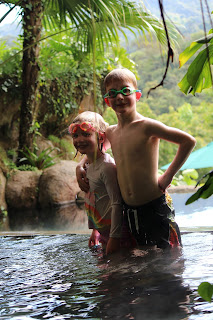 |
| Pool #1 |
 |
| View from pool #1 |
 |
| In the waterfall pool |
 |
| Fishing for trout for lunch with view of the aviary and some of the lodge rooms in the background. |
 |
| "I caught a trout!" |
 |
| Playing in one of the pools |
The next morning after a large buffet breakfast, we met our guide, John, for a private tour of the gardens and nature park. He was the same guide we had last time we visited the park! We started at the aviary where we saw beautiful red scarlet macaws, green parrots, yellow-breasted and keel-billed (rainbow) toucans, smaller aracari toucans and a green toucanette, a caracaras, owls, black-bellied whistling ducks as well as two two-toed sloths. Costa Rica is home to over
900 species of birds, 600 species are residents and the rest are migratory birds,
such as warblers, hummingbirds, orioles and tanagers. Then we headed to the butterfly observatory where hundreds of chrysalis were hanging, waiting to hatch into beautiful butterflies. Sadly the lifespan of a butterfly is only 14 days so they are constantly collecting eggs, feeding caterpillars and collecting new chrysalis (and cocoons from moths) to replenish their population. Next stop was the monkey exhibit (both white-faced capuchin and spider monkeys) who were there because they were either taken by poachers as babies and confiscated at the airport or found as pets in people's homes. They kids enjoyed seeing them up close. After watching our guide feed the monkeys, we were off to feed the hummingbirds in the garden. With nearly two dozen species it was amazing to watch these small but iridescent birds come and go. They spend nearly all their time flying as their legs are quite weak. Their wings flap up to 80 times per minute (and their heart can beat over 1000 times a minute) and when we held the feeder close to our faces, we could feel the breeze from their wings and hear the loud humming sound, which gives them their name. Next, we visited the serpentarium where we saw poisonous coral snake and learned the phrase, "Red next to yellow, kills a fellow. Red next to black, friends with Jack." Then we visited the jungle cats exhibit (with three jaguars, two cougars, two ocelots, and a margay). Lastly, off to the ranarium (or froggery), where we saw the famous red-eyed tree frog and a room full of tiny blue jeans and green and black "army" poisonous dart frogs.
The nearby
Poas Volcano is an active volcano and was closed for two days after we arrived due to activity and "eruptions" (mostly just ash, steam and other emissions) but it reminding us that we were sitting on a geothermal hotspot. That night at dinner, the kids were playing in the library next to the restaurant and they came running to us because there was a small jolt and a crashing sound. They didn't know what it was. "Terremoto" said the waiter. "Huh?" replied Theo. "Like they have in California." He said. Theo looked terrified and confused.
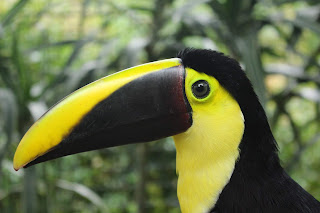 |
| Yellow breasted toucan |
 |
| Keel-billed (rainbow) toucan |
 |
| Watch out! |
 |
| Scarlet Macaw |
 |
| Black-bellied duck |
 |
| Theo and the sloth |
 |
| Good morning Ms. Two Toed Sloth |
 |
| Time to eat |
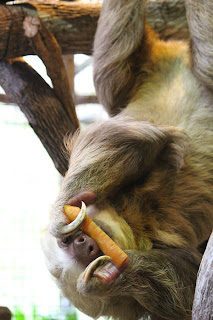 |
| Two toed sloth |
 |
| Blue morpho butterfly |
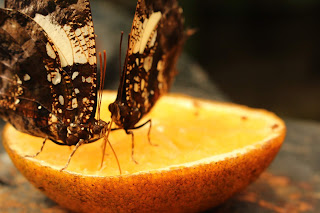 |
| Butterflies drink the juice with their long tongues, called proboscis, can you see them unfurled in the fruit? |
 |
| Costa Rican Monarch Butterflies |
 |
| Lots of chrysalis getting ready to hatch |
 |
| Monarch butterfly just hatched from a chrysalis |
 |
| Feeding the spider monkeys |
 |
| Ocelot feeding time |
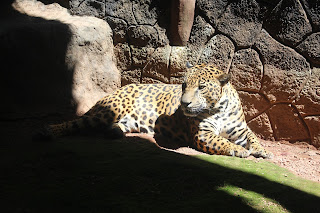 |
| Male jaguar resting in the sun |
 |
| Female jaguar pacing back and forth waiting for lunch! |
 |
| Margay- small cat |
 |
| Red eyed tree frog |
 |
| Red-eyed tree frog, which has sticky pads on its feet and eats only insects |
 |
| Golden eyed leaf frog |
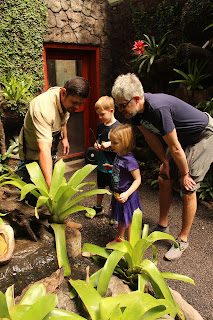 |
| Checking out the frogs in the ranarium |
 |
| Blue jeans poisonous dart frog |
 |
| Army poisonous dart frog |
 |
| Ox and cart |
 |
| Traditional cart |
 |
| The path down to the waterfalls |
 |
| Rainbow below the falls |
We headed back to San Jose on Tuesday afternoon and went to the Museo de los Ninos (Children's museum) at the recommendation of someone at the lodge. It was lovely! Part science museum, part zoo, part train museum and part Children's museum, it was fun to explore and learn about the history of Costa Rica. The next day we were off on a tiny plane to Tortugero on the Caribbean. (Details of the rainforest adventure will be on the next post.)
 |
| Children's Museum |
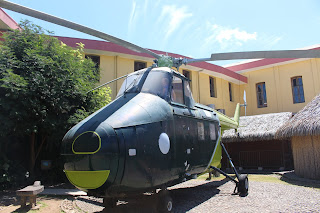 |
| An old helicopter at the museum |
 |
| An old plane at the museum |
 |
| Driving the plane |
 |
| Give that back! |




































































Comments
Post a Comment